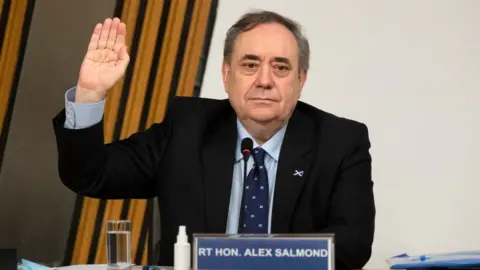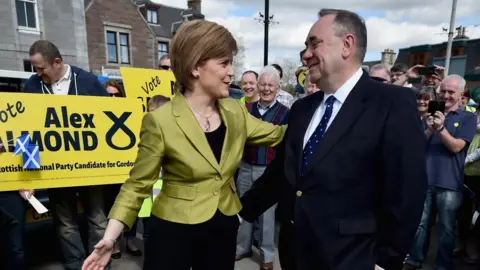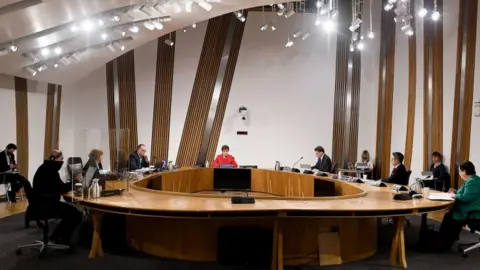New system for complaints against Scottish ministers
 Getty Images
Getty ImagesComplaints against ministers will no longer be investigated in-house by the Scottish government, in a shake-up prompted by the Alex Salmond row.
The government was found to have acted unlawfully while investigating two internal harassment complaints against the former first minister.
A review by Laura Dunlop QC had recommended that such inquiries should be independent of government.
First Minister Nicola Sturgeon said she was determined to learn from the row.
In her formal response to the Dunlop review, a Holyrood inquiry report and another probe which cleared her of breaching the ministerial code, Ms Sturgeon said her goal was to embed a culture within government "where bullying and harassment is not tolerated and where there is trust in how matters will be handled if things go wrong".
Opposition politicians said it was right that the government "learns from its mistakes", but said ministers "should be ashamed" that women had been let down.
The plans will see the government move on from the complaints-handling process drawn up in late 2017, which was used to investigate two complaints against Mr Salmond submitted in early 2018.
The former SNP leader raised a court challenge complaining that the investigation was unfair, and the government ultimately conceded that it had been "tainted by apparent bias" due to a procedural flaw.
Mr Salmond was awarded more than £500,000 in legal costs, leading to a series of probes - within government, at the Scottish Parliament and independently - into what went wrong.
The former first minister - who was also cleared of charges of sexual assault in a separate High Court trial - told MSPs that he had been the subject of a "malicious and concerted" attempt by SNP and government officials to remove him from public life.
However Ms Sturgeon told the inquiry committee that while there had been a "very serious error" in the government investigation, the claims made by her predecessor about a plot against him were "absurd".
 Getty Images
Getty ImagesLaura Dunlop's report concluded that it was "extremely difficult" to fit the investigation of complaints into "any structure connected to the government in power when the allegations came to light".
The QC recommended that any formal complaints against a former minister "should be investigated and adjudicated independently" of government.
The Holyrood inquiry committee also called for widespread changes, saying the handling of complaints against Mr Salmond was "seriously flawed" - adding that "the Scottish government was responsible from an early stage for a serious, substantial and entirely avoidable situation that resulted in a prolonged, expensive and unsuccessful" court battle.
A majority of members on the committee also said Ms Sturgeon had misled them about her dealings with Mr Salmond.
However she was cleared of breaching the ministerial code by Irish lawyer James Hamilton, who accepted the first minister had given an "incomplete narrative of events" to MSPs - but concluded that this was due to a "genuine failure of recollection" and not deliberate.
'Independent procedure'
The government has now issued its formal response to the three reports, all of which were published in March before Holyrood broke up for the election.
It confirmed that an "external, independent procedure to oversee formal complaints about former and current minsters' behaviour" would be set up.
A "propriety and ethics team" will also be established to "ensure the highest standards of propriety and integrity across the civil service in Scotland".
And action is to be taken to improve the government's storage and use of records, after criticism of failures to hand over documents to the court during Mr Salmond's judicial review bid.
 PA Media
PA MediaMs Sturgeon said the government "apologises unreservedly" to the two women who made the original complaints - who had accused the government of not giving them enough support.
She said: "It was right that these complaints were taken seriously and investigated. However it is clear that the complainers have been let down.
"Their testimony - included within the committee's report - is particularly upsetting and raises important issues that we must reflect upon within the Scottish government, the parliament, and across wider society.
"Our aim is to ensure a culture of high performance and mutual respect between ministers and civil servants, where productive working relationships are valued and nurtured, and bullying or harassment in any context is not tolerated.
"We are determined to learn from and apply the insights from these reports to build a culture where concerns are addressed early, and where all those involved with a complaint have confidence and can engage constructively and fairly in the process."
In response, Jackie Baillie - Scottish Labour's deputy leader and a member of the Holyrood inquiry committee - said it had become clear that the government's complaints-handling processes were "simply not fit for purpose".
And she said it was "simply wrong" for Permanent Secretary Leslie Evans to have "a leading role" in the creation of the new process, given the failures in drawing up the previous one.
Scottish Conservative MSP Murdo Fraser said it was "shameful" that nobody had lost their job over the affair, adding: "The lack of a culture of accountability has been staggering and that must change if people are to have any confidence in procedures going forward."
In March, Mr Salmond announced plans to take fresh legal action against the government over the conduct of Ms Evans, saying she had failed to take responsibility for the debacle.
He attempted to launch a political comeback in May's Holyrood election, but saw his Alba Party win just 1.7% of the vote and fail to secure any seats.
